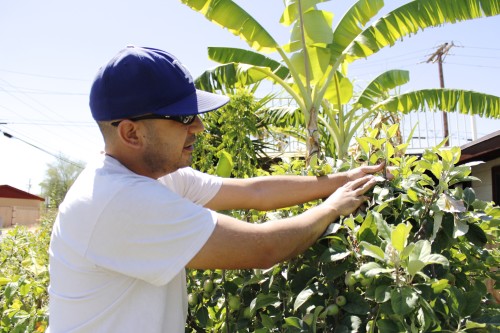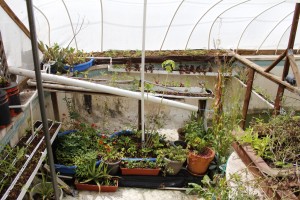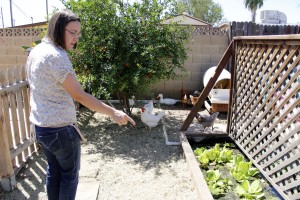
After purchasing their new home in Mesa in 2009, Dennis McClung sketched out a plan for the broken swimming pool in their new backyard.
Make it a greenhouse.
One year later, the “Garden Pool” was finished. What was once a large, deep, swimming pool, is now a greenhouse, home to fish, chickens and vegetables aided by rainwater and solar power.
“I didn’t know what I was getting into at the time,” McClung said.
Now he runs a nonprofit that helps Arizonans and people throughout the world convert their pools into their own sustainable natural grocery stores.

At the bottom of McClung’s pool, the 3 feet of water serves as a pond, and rainfall provides water for the system. Tilapia swim about and chickens run free. A solar powered pump is used to circulate nutrient-rich pond water and rainwater to irrigate the soilless vegetables, which are grown in the shallow portion of the pool.
“We feel it’s cut our food bill down 40 percent,” McClung said. “Because a lot of what we grow, we get a lot of eggs, and milk. We have milking goats so we get about a half gallon of milk a day, which is more than what we need, and then lots of fruit and vegetables.”
According to McClung, a swimming pool is one of the biggest uses of electricity and water usage in a house, so by converting it into a Garden Pool, they are able to save money on electricity and water.
Since McClung converted his pool and started a website about the process in 2010, it has been his goal to help others create their own garden pools. His Garden Pool nonprofit receives money through donations, fundraisers, as well as selling parts, fittings, and plants online. The Garden Pool hopes to receive grants in the future.
“So it’s been a long time coming and it’s really been all grassroots,” he said. “We have about 1,200 volunteers and we do projects all over the place.”
Online tutorials help others learn how to convert their own pools.
“We just try to serve as the hub for information on the Garden Pool. We helped build dozens all around the world. It’s neat to get feedback and it helps fuel our research,” McClung said.

Homeowners who want a Garden Pool can pay a design fee of $450, and the Garden Pool uses volunteers to build it, usually taking about one day, according to McClung.
Erin Gerston took a tour of the McClung’s Garden Pool in 2012, started volunteering, then hired Dennis and his wife Danielle, who works full time for Garden Pool, to help her build her own Garden Pool.
“At the time, my mother was fighting cancer, and I was researching everything I could get my hands on,” Gerston said. “What came out was a burning desire to grow at least part of my food for my family. I know with certainty that there have never been any pesticides, carcinogens, or GMO’s near my tilapia, chickens, vegetables, or fruit.”
Gerston’s Garden Pool is more of a garden pond. Since Gerston didn’t have an existing pool, they simply dug a pond for the fish. It works the same as the Garden Pool, just looks different, according to Gerston.
Volunteering entailed digging, hauling, prepping plumbing, cutting lumber, among other tasks to help the Garden Pool come together in a short amount of time.
“My favorite part is taking a pile of materials and creating a system that can help a person grow their own food in a sustainable way,” Gerston said. “It is really exciting when it all comes together.”
Garden Pool and their volunteers have built Garden Pools in California, Las Vegas, Tucson and the suburbs of Phoenix.
Last year, they raised money to design and build a Garden Pool with Naturopaths Without Borders in Haiti. Since there was not enough sunlight for the Garden Pool on the ground, they built it on a rooftop, which is what they consider to be the first rooftop Garden Pool in the world.
“The cool thing about places in the tropics, is it’s warmer than Arizona, and it doesn’t have the winters like we have,” McClung said. “In the tropics, the system takes off really, really fast and it does very well so we’re excited to go back and go to other countries.”
The Garden Pool team has trips scheduled to West Africa, Ghana, Morocco and the Saharan desert.
“In Haiti, it was really more of an education thing, we come and do it and taught them sustainable cooking practices, so it’s really kind of a lifestyle change, but it made a lot of sense to them,” McClung said. “The Haitians were some of our best students and very ambitious and they valued it a lot. So, that to me is the coolest thing, because we are changing lives.”
Holly Regan is a reporter for Arizona Sonora News, a service from the School of Journalism with the University of Arizona. Contact her at [email protected]
Click here for hi-res photos.


